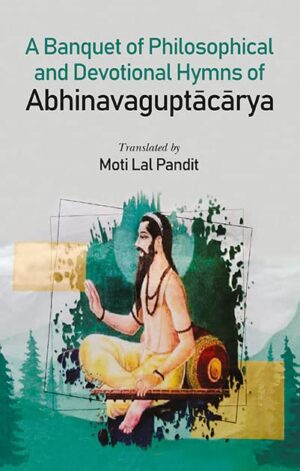A Banquet of Philosophical and Devotional Hymns of Abhinavaguptacarya
About the Book
The collection of hymns of Abhinavagupta that have been translated, and are accordingly being presented to the public, represent such a diversity of thought of the composer of these hymns as would encompass the doctrinal, devotional and philosophical aspects of what has come to be known as the Shaivism of Kashmir. These hymns express the simplest mode of instruction in terms of which is conveyed the essence of non-dual spirituality that has been developed, both theoretically and devotionally, by the Siddhas and the accomplished Gurus of the Trika lineage. The thrust of this Trika spirituality, as expressed in these hymns, is to find out such ways and means as would lead to the transcendence of the profane by entering into the realm of the sacred. It is in terms of the entrance into the sacred that the profane structures of dualism are overcome, and thereby is allowed the flow of the theophany that terminates in the experience of the epiphany of deification. Such a state of divinity pulsates the very core of existence in such a manner as would allow the perception of divinity to occur. This realization a divinization forms the core of these hymns, and so the entire universe is seen but the self-expression of Paramasiva. In the experiential state of non-difference is comented perfect unity in terms of which disappear all the conceptual differences which is the bane of empirical mode of life.
- Author: Moti Lal Pandit
- Publisher: Dev Publishers & Distributors
- Edition: First
- Year: 2023
- Dimension: 14 x 22 cm
- No. of Pages: 148
- Weight: 350 gm
- ISBN: 9789394852198
- Binding: Hardcover
- Territory: World
- Price: ₹ 795
About the Author
Moti Lal Pandit, trained as a theologian and linguist, has been engaged in Indological research nearly for last fifty yerars. He has published books and articles on a vast range of subjects. Initially he began his research in Vedic religion and philosophy. Gradually be shifted his attention towards Buddhism, and, as a result of this shift, he has been successful in publishing a number of books on Buddhist philosophy and history. For last several years, however, he has been engaged in the study of Kashmir Shaivism. Some of his publications are: Vedic Hinduism; Philosophy of the Upanishads; Essentials of Buddhist Thought; Samkara’s Concept of Reality; Did Marx Kill God; Buddhism in Perspective; Being as Becoming; Towards Transcendence; Transcendence and Negation; Sunyata: The Essence of Mahayana Spirituality; Buddhism: A Religion of Salvation; Encounter with Buddhism; The Buddhist Theory of Knowledge and Reality; The Trika Shaivism of Kashmir; The Disclosure of Being; An Introduction to the Philosophy of Trika Shaivism; The Philosophical and Practical Aspects of Kashmir Shaivism; From Dualism to Non-dualism; The Transcendental Non- Dualism of Trika Shaivism; (trs.) The Essence of Supreme Reality, or The Paramarthasara of Abhinavagupta, and (trans.) The Kramastotra of Siddhanatha.


